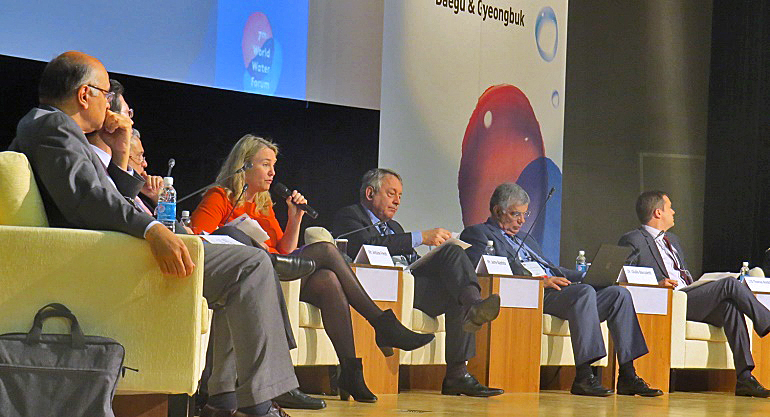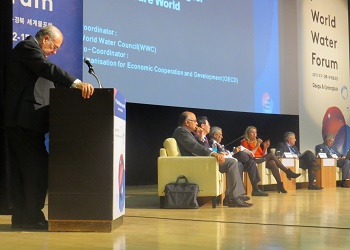WWF7: Dutch minister Schultz urges for consistent water policies to bring in the private sector

It should become attractive for private financers to invest in efforts to tackle worldwide water issues. This was said by Dutch Minister Schultz van Haegen of Infrastructure and the Environment at the 7th World Water Forum in Daegu, Korea.
"Whatever plans we make to build a water secure world, there will be no result without money. Financing is the key issue in all our discussions", said Schultz.
Long term planning
Minister Schultz attended the high level panel on water security and sustainable growth on 13 April. In this session she called for more consistent water policies to reduce the risks for the private sector. As an example she mentioned the recently formed long term fund to make the Netherlands more resilient against future floodings. This fund guarantees an annual funding of 1 billion euro till 2030.
 OECD secretary general Angel Gurria (left) chaired the panel. Jumaid Ahmad of the World Bank sitting first (from the left) in the panel.
OECD secretary general Angel Gurria (left) chaired the panel. Jumaid Ahmad of the World Bank sitting first (from the left) in the panel.
More private money
The OECD and the University of Oxford presented the study 'Fit to finance' during the World Water Forum that shows the importance of water security for economic growth. Making the world water secure will require huge investments. According to the study water supply and sanitation alone are expected to require 6.7 trillion USD by 2050.
Schultz: "One thing is crucial to me: the private sector should always be part of the solution. In addition to public funding, private money is increasingly necessary. We must create the conditions to get private financers interested. This will build a bridge between public and private money."
Smart financial coalitions
That is why minister Schultz is currently working with the World Bank’s Global Water Practice. "It is my aim to create a global public-private partnership, with the involvement of the International Finance Corporation of the World Bank, the Asian Infrastructure Investment Bank, the Asian Development Bank and other international institutions. Only smart coalitions can bring big results.’
Understanding the divers
Jumaid Ahmad of the World Bank Group's Water Global Practice, had a similar message. "It should not be money of the World Bank alone. We need to bring in the private sector but for that we need to understand the drivers. His example concerned Bangladesh and the success of micro-finance. "The poor walked away from the public sector", Ahmad said. In Bangladesh small entrepreneurs stepped in to deliver payable water services, also for the poor, Ahmad assured.
Secretary general Angel Gurria of the Organisation for Economic Cooperation and Development (OECD) referred to the title of the new OECD study. "We must make water fit for finance. Governments must build trust. There are always long term investors looking for good opportunities. As there will be more middle income families there are new opportunities. We must make new institutional arrangements."
Read also on this website
● WWF7: Buzzing Dutch delegation very active at World Water Forum in Korea, 21 April 2015
● WWF7: Be prepared for water-related disasters was key message Dutch delegation, 20 April 2015
● WWF7: Time for long term action plans as rare weather events become regular, 20 April 2015
● WWF7: Icomos recommends water heritage as inspiration for today's water management, 19 April 2015
● WWF7: Akvo Flow hits one million mark for field surveys, 18 April 2015
● WWF7: Global monitoring water quality: top down or bottom up?, 15 April 2015
● WWF7: K-Water and Deltares sign MoU on joint projects on integrated water management, 14 April 2015
● WWF7: Korea and Netherlands take occasion of world forum to intensify cooperation, 13 April 2015
● WWF7: OECD launches 12 principles to achieve more stable water policies, 13 April 2015
● WWF7: Strong Dutch delegation joins World Water Forum with positive message: Be prepared, 9 April 2015
● Special website on Dutch participation at WWF7: www.wwf7.dutchwatersector.com
More information
www.worldwaterforum7.org



